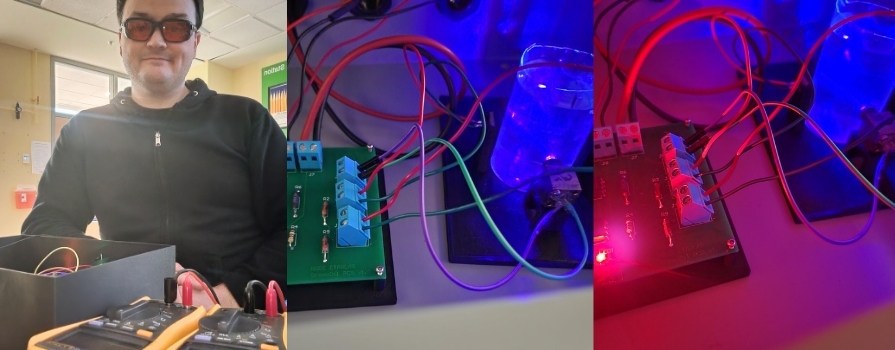Meet Michael, NSCC grad and research associate taking the next career step

Name: Michael Locke
Program: Electronic Engineering Technology grad, class of 2021
Research area: Engineered Technologies Applied Research
Campus: Ivany Campus
What brought you to NSCC?
I wanted to study physics but didn't see the point of getting a basic physics degree at a university because one has to pursue much higher levels of education for physics to be worthwhile. I love math and science, so NSCC's Electronic Engineering Technology program caught my eye. It combines my interests in math, physics and computers, making it the perfect fit for me.
What do you plan to do when you graduate?
Initially, I was drawn to programming and embedded systems, but after working in Applied Research at NSCC for three years, I realized I wanted to focus more on hardware, particularly analog electronics, radio frequency and motor control.
What’s something that has surprised you about NSCC?
I've been passionate about electronics long before I took the program. While I didn't find the coursework too difficult, the sheer volume of work was challenging. Time management was crucial, and I often did schoolwork 7 days a week. Working part-time in the labs on campus allowed me to earn extra money while completing my projects; otherwise, I don't know how anyone would have had time to work.
What advice would you give to a friend considering NSCC?
If you're a hands-on person, NSCC is the place for you. Speaking from the tech side, you gain practical skills that are directly applicable to the workplace, unlike the more theoretical approach of a four-year university program. My experience was all about learning real-world skills. You'll also find great support from the faculty, who are friendly and approachable.
How did you first learn about Applied Research at the College, and what motivated you to get involved?
I first learned about Applied Research from Jamie Thomson, a research coordinator who also taught the Technical Communications class. Passing by the energy lab on campus further sparked my interest. I began working full time over the summer of my first year as a student intern and continuing part-time throughout the academic school year on my senior project—a home energy monitor. The support from research associates like Cole and Ben was invaluable.
Of all the projects you worked on at NSCC Applied Research, which one fascinated you the most, and why?
We worked on a project with Green Oil Solutions, a company that makes bilge filters to minimize oil from going in the ocean. This project was fascinating and by far my favorite. We developed an analog circuit to detect oil in water, which used a 405nm laser to detect oil in water via fluorescence. The laser light changed from purple to blue when oil was present, which was incredibly cool to see. I enjoy analog circuits, and learning about laser physics was right up my alley. The sustainable aspect of this project felt important to the health of our oceans and made the work feel meaningful.
How do you personally define innovation?
For me, innovation is doing something new or improving an existing process to make it more efficient. For example, in the Green Oil Solutions project, I applied the science of fluorescence—which is not new technology—but modified what was already available to develop a more cost-effective solution for their R&D.
What or who has made your Applied Research memorable?
Engineered Technologies Research Scientist, Etienne Mfoumou, was an excellent boss; he provided support and mentorship without micromanaging. I enjoyed the freedom to work on various industry projects, applying what I learned in school to real-world situations. Immersing myself in engineering and its standards was a highlight.
What skills or knowledge have you gained as a research associate with Applied Research that will benefit you in your new role?
I've gained skills in analog circuit design, programming, embedded systems, motor control and automation. Drawing on this knowledge will be invaluable in my new job diagnosing problems that may arise with medical equipment.
I’m starting at Nova Scotia Health as a Biomedical Engineering Technologist next week. I’ll be maintaining, repairing and calibrating medical equipment used by doctors and nurses. Technically, I'll be a healthcare worker, but not frontline. After doing my work term there in 2021, I've been looking out for job postings. I'm really excited to advance my career in healthcare and support frontline workers in a rewarding way.
What advice would you give to students considering an internship or work with NSCC Applied Research?
Embrace it and give it your all. You will expand upon the knowledge that you gain in your program and get to work on some fun design projects with local industry. Working in Applied Research provided me with a unique opportunity to understand grant work and be part of collaborations with local industries. It's an excellent opportunity for both personal and professional growth.
